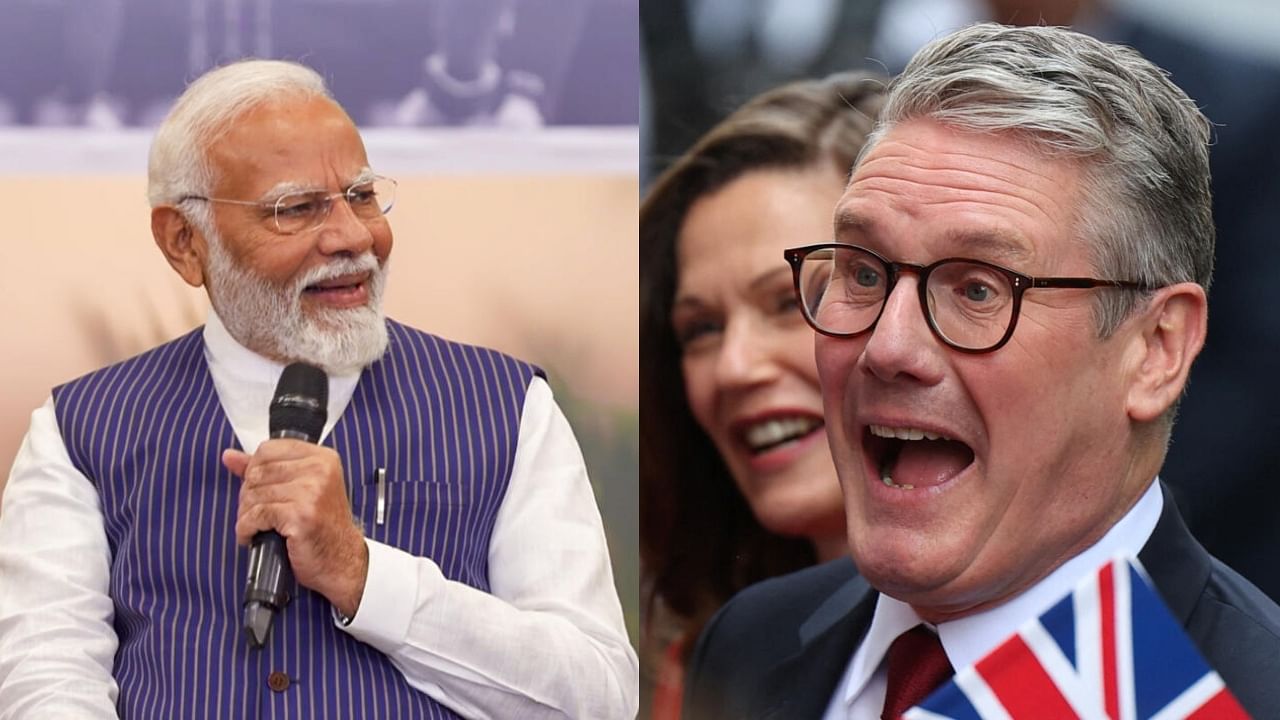
PM Narendra Modi; UK PM Keir Starmer.
Credit: PTI, Reuters Photos
As Keir Starmer steps into 10 Downing Street, there is talk of a reset in the India-UK ties. While New Delhi holds out hope, it is tempered by the reality that on contentious issues like Khalistan, Kashmir, and climate change as a trade barrier, London’s stance may indeed stiffen.
This dynamic interplay is akin to passing clouds, alternately casting shadows and letting through beams of opportunity. The Labour government may present political challenges for India, particularly on sensitive issues, but it also holds the promise of expanded trade opportunities. Yet, trade relations have been virtually stagnant; in 2024, bilateral trade was a mere $20 billion, up by a paltry $1 billion from the previous year.
Political storms on the horizon
Historically, Labour is more vocal on human rights, and maintains a critical stance on elements viewed as soloists by New Delhi. These issues are perennial thorns in the bilateral relationship, and Labour’s approach could exacerbate diplomatic tensions. New Delhi’s new assertive stance on core security concerns will inevitably complicate diplomatic engagements.
Trade winds of change
Despite these political challenges, a Labour government could be more inclined to cultivate economic ties, recognising the mutual benefits of a robust trade relationship, such as the ongoing negotiations for an India-UK Free Trade Agreement (FTA).
One of India’s key demands in the FTA talks is the free movement of people. The unhindered flow of skilled professionals and students is crucial for India. Labour’s historically inclusive immigration policies could align well with India’s interests, facilitating smoother negotiations. However, immigration remains a contentious issue in the UK. Whether Labour’s landslide mandate allows for a nuanced stance on skilled immigration as distinct from illegal migration remains to be seen.
Even if the immigration conundrum is resolved, the FTA faces hurdles due to the UK’s desire to impose a carbon tax across borders, potentially negating some tariff concessions. London seems not to have learned from India’s recent European trade agreement, which included Switzerland after 14 years of negotiation. New Delhi is unlikely to acquiesce easily for minor economic gains.
The European alternative
India must also consider the broader geopolitical landscape. The EU, with its expansive market and integrated economic framework, remains an attractive partner. The Comprehensive Economic Partnership Agreement (CEPA) with the EU offers India greater market access, and a more stable regulatory environment compared to a bilateral agreement with the UK. In 2023, India-EU trade was $145 billion, a significantly larger market than the UK. While protectionist climate policies are also a concern with the EU, the sheer scale of the market is a substantial advantage.
Navigating the clouds
The future of the India-UK relationship under a Labour government will undoubtedly be more complex than what optimistic commentators suggest. The UK will need to be more accommodating towards India, while India will have to be less sensitive to British outreach to Pakistan, an expected move under the new administration. Ultimately, India’s relationship with the United States will heavily influence its partnership with Britain, which is now a smaller player on the global stage. A pragmatic Britain could still become a win-win rainmaker for India, but only if it navigates these passing clouds astutely. Bring out the brollies.
(Ninad D Sheth is a senior journalist.)
Disclaimer: The views expressed above are the author's own. They do not necessarily reflect the views of DH.